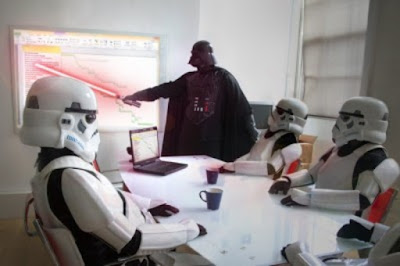“Get a job!” It's a refrain we're always hearing, as well as the title of a doo-wop classic, but, as that song and anyone who has tried to join the workforce can tell you it’s rarely that easy. Tabletop roleplaying games, on the other hand, offer the freedom to give your characters any employment history you can think of (within the bounds of the setting and their character build), whether it’s the thing they did before answering the call of adventure, or what they’re still doing between your game sessions. This week, we’re going to talk about the ways characters’ former (or current) jobs can flesh out their background and present new roleplaying opportunities, no matter which side of the GM screen they're on. - B
B: Of course, I start with the disclaimer that, in the game I run most (Paranoia XP/25th Anniversary), job assignment is part of the character creation process. Being Paranoia, of course, the player gets no say in this - it’s purely according to
A: All too often in character creation, and even in playing of those characters, employment is altogether ignored. When I first got into Dungeons and Dragons during 2nd edition, a character’s employment was never really considered. Fortunately for me, when I started playing 3rd edition, my DMs would try implementing the idea themselves... to varying results. Typically, they would give players some sort of skill or bonus to encourage their choice. The 4th edition of D&D also largely neglected this aspect of a character's background, as did the DM of the few 4E sessions I’ve played. However, 5th edition does include this as part of the character creation process. Picking your “background” is often a selection of various professions. You might have something simple and decisive such as Sailor, Gambler, or Fisher. Although, you could select a somewhat more abstract background like Folk Hero or Sage. No matter what you end up picking or develop with your DM, you'll end up with some extra skill/tool proficiencies, maybe some additional equipment, and possibly even a special feature. The Criminal/Spy background is a great example, giving a character access to a network of criminals or informants.
All of these benefits are great, but, on their own, players will still miss out on one of the important opportunities collaborative can storytelling provide. When creating your background, and, for this post, your character’s career/job specifically, you have a chance to help form the world your character will be getting to live in. Likely, there are a number of common folk your character has had dealings with on a regular basis. To take the Fisher background, for example, you might have other fishers from the docks you’ve dealt with; dock masters, bait sellers, fish-mongers that you supply on a regular basis... All of these non-player characters are big opportunities to give your world depth and possibly give your character some different ways to interact and engage with the "roleplaying" parts of RPGs. Even in other genres, a character might still have former coworkers at the replicator repair shop, as well as a former boss overseeing the place.
It is important, though, to do all of this in tandem with the person who will be running your games. Four players adding 3-4 NPCs to your world, all on their own? That can be an overwhelming prospect. Any career or background you consider should be developed collaboratively, with either the entire group or at least the DM. More than one, or even all of the players at the table, might be considering the same choice, such as Mercenaries, Acolytes or Nobles. Knowing this can give either an opportunity to make connections with the other player characters (shared histories can be helpful in games) or make you all reconsider your choices and character designs. It might even lead the whole campaign down a new path. Did everyone choose a pirate background? Sounds like you might all be on the same page for a certain type of campaign. Bugsy, how do you use the careers of the player characters to enhance your stories? What do you think of characters picking up new career paths during their adventures?
B: Jobs are good for reminding the PCs that the world doesn't revolve around them (unless you're playing something like Exalted). There are other characters living their lives, and things still take place even when the PCs aren't around. Connecting these elements to the characters' personal backgrounds can help prevent the all-too-common problem in media where personal backstory is only revealed shortly before it becomes immediately relevant. ("If they're only showing us the detective's brother now, he's going to be either the killer or the next victim.") At the tabletop, where narrative time is at a higher premium, basic bits of world development might come across as telegraphed narrative direction - but this is less likely if they players already expect a developed past and lifetime of social connections their characters have made before the adventure begins. Even if the characters haven't had liberal jobs (if they're kids, for instance, or their unique circumstances have led them directly into their present situation), there are aspects of their pasts that can be developed, whether it be classes at school or apprenticeships or community religious services. All of them involve some degree of interaction with the larger world, and all help to keep your characters from being the stereotypical "amnesiac friendless orphans" RPG characters can come across as.
This approach can also be of benefit to the GM, even if they don't have the time or resources to develop full employment histories for every single NPC they players might meet. Just having a quick idea of a character's relationship to their current position will make them feel more developed and accurate in portrayals. They have to get past a guard? Have an idea about how he feels about being a guard. Is he a young recruit whose never dealt with people much before, a stoic lifetime professional, or an old soldier running down the clock until retirement? Keeping something in mind will not only provide a little color to the situation, but might also give the PCs some ideas on how to address it. Most of all, it's more fun to make and present a world full of life and variety. Work may be a pain in real life and for your characters, but everyone experiences it a little differently, and every hour on the clock is story of its own.
Send comments and questions to neversaydice20@gmail.com or Tweet them @neversaydice2.



